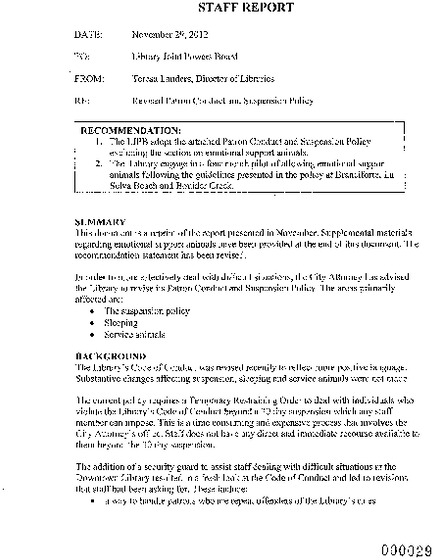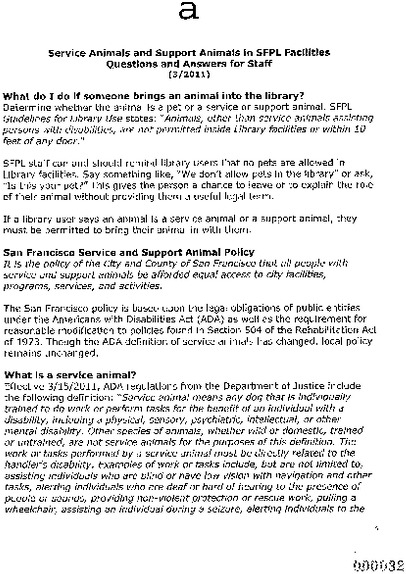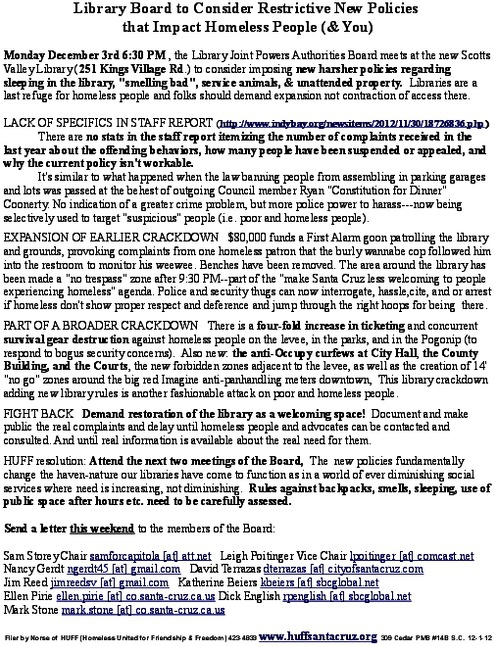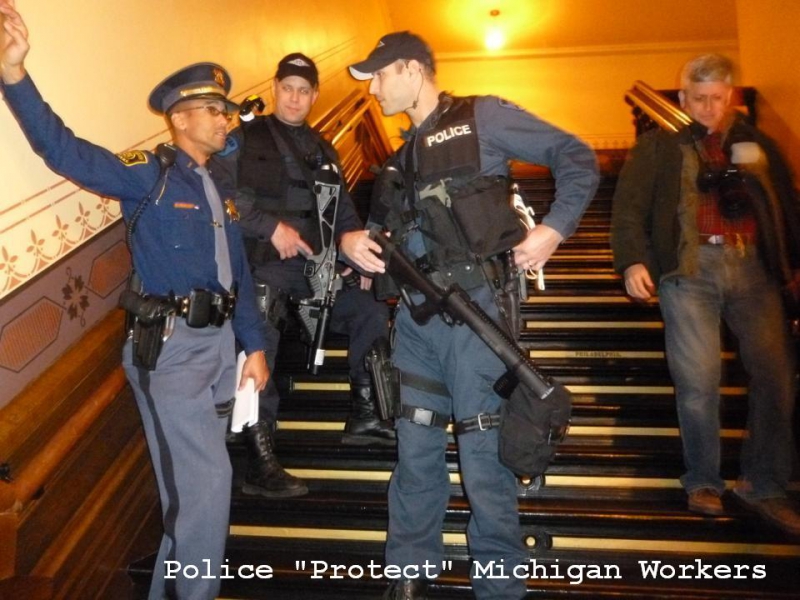NO SLEEPING BAN BUT INCREASED PENALTIES GENERALLY
While a strong voice from the community defeated one small part of the heightened penalties in the County’s public library system (the “Sleeping Ban” provision), everything else requested by Teresa Landers, Head Librarian, passed. And the Sleeping Ban is likely to be brought up again at a subsequent meeting now that its chief opponent Katherine Beiers is off the City Council (which appoints two members to the Library Board). David Terrazas, the other Council appointee, seems gung-ho to socially cleanse the library of the blight of visible homeless people there (or insist they store their property in non-existent lockers, have a good night’s sleep at a non-existent safe sleeping spot, and shower at hard-to-find shower services before entering the privileged portals).
At the bottom of every e-mail Teresa Landers’ sends is a boilerplate quote: “The libraries’ most powerful asset is the conversation they provide–between books and readers, between children and parents, between individuals and the collective world…Turns out that libraries have nothing at all to do with silence.” Bella Bathurst, “The Secret Life of Libraries,” The Guardian (U.K.), May 1, 2011.
But did this same Landers spearhead the campaign to increase penalties and tighten rules around service dogs, bad-smelling people, sleeping, and unattended backpacks in the library? We don’t know since she’s refused to reveal the history of her e-mails on the subject (as required by the Public Records Act).
The latest set of procedures, which she twice argued for at the November and December library board meetings expands broad disciplinary/exclusion powers of library staff. Apparently the focus is to exclude “troublesome” homeless people “using” the library with their backpacks, odors, and sleep-deprived (city-created) disability.
But what is the real magnitude of the problem. I could get no answers from her at the Library Board meeting in early December (“I don’t have my records with me”). When I tried to get access to records subsequently, well–read on…
Bruce Halloway, a member of the public in the audience at the December meeting, several times addressed the Board. On one occasion he remarked that Landers had refused to provide him with access to the previous meeting’s minutes, instead brushing him off and telling him to write out a Public Records Act request and wait 10 days.
I expressed concern that Landers had not provided an Agenda packet to the audience, so we could tell what the Board was talking about. Nor had the Agenda provide any clarity about which items were open for public comment and which were not—something apparently the Chair decided arbitrarily. See “Update: Small Victory, Larger Defeat” at http://www.indybay.org/newsitems/2012/11/30/18726836.php?show_comments=1#18727113
SEEKING WISDOM IN OLD RECORDS
To delve deeper into the reasons for the new anti-homeless policy, I sent the following Public Records Act Request on December 4th:
To whom It May Concern:
Please provide access to all copies of complaints against patrons at all branches of the Public Library system from Jan 1, 2012 through the present as well as any records, e-mails, statements, written, audio, or visual regarding library policies impacting library rules that might result in a warning or suspension of library access. This would include communications to and from the public, public officials, police, security agencies, and any other group or person around this issue.
Please also provide access to copies of all agendas and minutes of the Board’s meetings through 2012.
I prefer e-mail access to these records. In the event this is not possible, I would like to see the records prior to deciding which ones I need to copy.
Please advise me whether a hard copy of the minutes of the prior meeting and agenda packet was available at each of these meetings.
Further, please advise me as to whether action items were listed as such on the agendas.
Finally, please advise me as to whether a public comment was provided for each agenda item (as it was not at the December 3rd meeting, except for the one “staff report” item on the rule changes).
I would suggest you publicly announce all these conditions will be corrected at the next meeting or face a Brown Act complaint.
If you have any questions regarding this request, feel free to call me.
Thanks in advance for your assistance.
Robert Norse (831-423-4833)
Not having heard from her, on December 12th, I sent this follow-up:
Please acknowledge receipt of the Public Records Act request and advise me of its status. Thanks, R. Norse
RESPONDING TO A NON-RESPONSE
Still not having heard from her, four days beyond the legal deadline she is required to respond by, on December 18th, I sent the following:
Teresa:
You have not responded to my query of December 4th. That feels rude and unhelpful. It also throws into question your suggestion to a member of the public prior to the last Library Board meeting that making a Public Records Act request in writing is the proper public mode to secure records you are unwilling to provide informally. You may recall you refused to provide a copy of the minutes from a previous meeting because of “staff problems” and required him to make a written Public Records Act request.
More important, however, you have also not responded to the Public Records Act request in that e-mail (repeated below for your convenience). This contravenes state law, requiring a response within 10 days or some explanation of the delay. For your convenience I have emphasized in bold the specifics requested in the Public Records Act communication of December 4th.
You have also not advised me of the status of the request as requested in the e-mail below of December 12th. Please do so ASAP.
You also declined to make available the agenda packet of the Board at the last Library Board meeting, nor to assure us that this will be done for all future meetings as a matter of public right under the Brown Act. Please reassure us on this straightaway.
Moreover the make-up of the agenda seemed to make it unclear which items were actually agenda-ized (and so required the Board to hear public comment) and which weren’t. Again, I request you clarify that for future meetings this be made obvious to the public, so that the chair is not put in the position of differentially allowing comment on some items, and not on others.
If you decline to provide an answer to the other simple questions put forth in the December 4th e-mail, you require me to seek further public records which I feel unnecessarily burdens you and your staff, so please avoid this by being direct and concise.
If you are not the appropriate person to address these concerns, please so advise me. I am also cc-ing the chair of the meeting. I believe that between the two of you, you share responsibility here.
Thanks, Robert Norse
I included a copy of the original Public Records Act request of December 4th with the first three paragraphs reprinted in bold for emphasis.
TERESA RESPONDS
To this, Teresa responded (on December 18th). She wrote “I provided the information requested that I have available to the City Clerk’s office which processes Public Records Act requests for the Library. That office will be responding to your request if they have not already done so.”
Note she did not answer any of the questions directly whatsoever, information she surely had about providing agendas to the public, etc.
I replied on the same day: Thanks, Teresa. Please send me a copy of your forwarding request–which would include the date forwarded. It’s not clear to me why you didn’t respond directly to me, since you clearly have the information and I’m the one who wants it. Could you clarify?
She declined to send me a copy of her forwarded e-mail to the City Clerk’s office but did right (again on the same day): “The City Clerk’s office has a way to track requests so they handle them for us. Also, some of the information you requested is not in the Library’s possession so the City Clerk;s office handles gathering the information.”
This, of course, ignored any information she might have and sloughed off any personal responsibility which she likely has for creating agendas, making them available, providing her own e-mails on the subject to the Board, etc.
ANGER FROM THE STREETS & THE SLAPDOWN THAT FOLLOWED
Ricardo Lopez, a street musician who can often be found in front of downtown New Leaf on Pacific Avenue, wrote Landers an angry letter about the situation which included some harsh criticism such as
“Come on T.L.. whatta ya thinking? …You’re above the law, because the law is for the people who have so much less wealth than you, right?…you’re… apparently nursing some kind of psychological misanthropy … Quit. Let someone else make the city run right….Just buckle down at Macdonald’s or Taco Bell, or where ever your new job is, and work hard to make Santa Cruz a better place in your own little way, which is much better than your doing now. Right? You can’t or won’t or don’t want to do your job. So it will be easier if you’ll just get out of the way, and let a decent, moral, psychologically stable, and more importantly competent person administer…”
Within a week, Lopez notes, he was accosted in the library by a burly First Alarm security guard under the new “unattended property” (he’d left his backpack at another table while using the library computer, he says). Lopez reports that though he was able to retrieve his backpack, which the guard threatened to “throw outside”, he is now apprehensive about returning to the library.
PERSISTING IN THE PUBLIC RECORDS ACT REQUEST BUT STILL NO CIGAR…
In response to Landers e-mail, I replied: Thanks again, Teresa. I don’t see a copy of the e-mail forwarded to the City Clerk. Could you please forward that to me, please, as requested since this Public Records Act is now overdue. Also while I appreciate your forwarding requests about information you do not have to the City Clerk, it would save time (and frustration) for you to forward information you do have to members of the public directly. Will you be doing this or will you continue to reroute requests through the City Clerk? Thanks, R
The next day city administrator/clerk Bren Lehr cc-ed me that he was directing Nydia Patino to provide some long-awaited answers. I thanked him.
On the same day one of Lehr’s workers sent me an e-mail advising me that Board packets from 1997-2005 were available for review and that more recent ones were on-line at http://www.santacruzpl.org/aboutscpl/govern/ljpb/. She also included the Manual for “Problem Situations” dated 2007 (without the latest harsher measures passed by the Board three weeks before) and some e-mails between Landers and different groups. However there was no specific record of the supposed complaints that prompted the tightened policies.
There were some interesting exchange between Councilmember and Library Board member Terrazas & Landers suggesting that a “Triple Fine Zone” be established at the library, similar to the one to rein in drunken revelers (and collect a bit of cash for the City bureaucrats) on Halloween, the 4th of July, and New Year’s. I’ve yet to parse those but hope to do so soon with an additional report.
STILL LOOKING FOR THE RECORDS–AND ANOTHER DELAY UNTIL AFTER THE HOLIDAYS
So I replied the next day:
Pursuant to California Gov’t Code 6253(a) I ask you to collect the Library’s completed “incident reports” for year 2012 for all branches, so that I may arrange to inspect them at the Santa Cruz Main Library, and choose to have some or all of them copied for me.
Note that although these incidents reports are declared to be confidential and to not be public records, your agency cannot declare records to be exempt from the California Public Records Act (CPRA) by fiat. They are not investigatory records of a security agency. They are not personnel records. I do not believe they are exempted by any California state law from being made available for my inspection. The privacy of third party individuals may be protected by redacting those portions of these records prior to my inspection.
If these records are available electronically, such as in PDF or DOC formats, then I ask that they be made available to me electronically, preferably by email.
Thank you for ensuring the operations of the Santa Cruz library are open and transparent to the public by fulfilling this request without obstruction or unnecessary delay.
And a day later, Landers replied: “The incident reports you have requested are not maintained by the Library. Once we have reviewed them they are filed with the risk management division of the City. That office is closed until January 7, as is the City Clerk’s office. The City Clerk’s office will arrange for you to review those documents after January 7. They are not available in electronic form.”
That Landers made no mention or itemization of complaints received over the last year in pressing for a new policy or in formulating one in internal memos, seems to me unlikely. It was also her responsibility to have responded to this request by December 14th—which included forwarding it to the Risk Manager. The point being that unless one continues to apply persistent pressure, answers don’t come.
Those who wish to weigh in on this issue can find e-mails for the Library Board (minus Beiers) at http://www.indybay.org/newsitems/2012/11/30/18726836.php .












